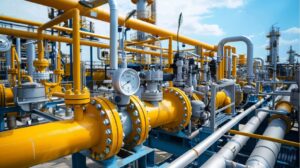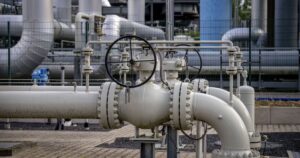
Naftogaz of Ukraine has attracted an additional €50 million from the European Investment Bank for gas imports, the company said
“Another important step to get through the winter stably. Naftogaz has attracted an additional €50 million in financing from the European Investment Bank,” Naftogaz said in a statement on Telegram on Thursday evening.
According to the statement, these funds will be used to import gas and support the energy system during peak loads, when cold weather and shelling create the greatest pressure.
It is noted that the loan was made possible thanks to the support of the European Commission.
As indicated by Naftogaz, this financing complements the EUR 300 million EIB loan and EUR 127 million in EU grant support with the participation of the Norwegian government that have already been raised.
“It is also important to note that Naftogaz has committed to reinvesting the equivalent of this amount in renewable energy projects,” the company said.

The European Bank for Reconstruction and Development (EBRD) and one of the European countries will provide Ukraine with EUR85 million for the purchase of additional gas volumes, First Deputy Prime Minister of Energy Denys Shmyhal said.
“EUR 85 million through EBRD instruments for the purchase of additional gas volumes for Ukraine. Work on obtaining the relevant grant from one of the European countries is already being completed,” Shmyhal wrote on Telegram on Tuesday.
He noted that this was discussed during an online conversation with EBRD President Odile Renaud-Basso.
“We are grateful to our partners for this! We will continue to work together to find additional sources of funding,” the head of the Ministry of Energy emphasized.
According to him, it is also extremely necessary to continue financial support from the EBRD to Ukrenergo and Ukrhydroenergo, as this helps to provide repairs, equipment, and implement new solutions so that people have light and heat.

The prolonged cold spell in Europe is pushing gas prices up. The spot price for “day ahead” delivery on the benchmark European TTF hub closed at $486 per 1,000 cubic meters on Wednesday, adding 11% in just one trading day. This is the highest level since June 2025.
On Thursday, trading opened at $491. At the moment, the price has adjusted to $477.
Air temperatures in Europe in January this year are falling to their lowest levels in the last decade and a half. Overall, January (which is already the coldest winter month) is expected to be three degrees colder than the climatic norm and four degrees colder than last year.
Clear weather is accompanied by low wind speeds, or even calm conditions. This increases the load on the power system, as it reduces the output of wind farms. The reliability of the power system is maintained primarily by underground gas storage facilities, which are the most flexible source and closest to the points of consumption.
The average level of gas reserves in underground storage facilities in Europe fell to 48.4% at the end of the gas day on January 20, according to data from Gas Infrastructure Europe. This is 15 percentage points lower than the average for the last five years. At the moment, European underground gas storage facilities are ahead of the usual rate of consumption by four weeks. Moreover, the GIE observation base knows of examples when such a level (or even much higher – 59%) of reserves was reached only by the end of the withdrawal season and the start of injection.
By the end of 2025, countries in the region had purchased 109 million tons of LNG (142 billion cubic meters in regasified volume), which is 28% more than in 2024. In January 2026, liquefied gas imports could reach 10 million tons, which is 24% higher than a year earlier. And this could be a new record for the European gas industry. Despite high demand, there remains a large unused capacity reserve – on January 20, terminals were operating at 51% of their capacity. There is also a noticeable trend of declining LNG stocks at terminals.

Over the past month, BETS held 117 trading sessions for the purchase and sale of natural gas on the medium- and long-term market, as well as four trading sessions each day on the short-term market.
A total of 304 starting positions were formed at the BETS trading platform for trading resources in December 2025, January 2026, and subsequent months, in the gas transmission system and underground gas storage facilities. A total of approximately 156 million cubic meters of natural gas was sold on the medium- and long-term market. 9.08 million cubic meters of natural gas were sold on the short-term market.
On the medium- and long-term market in December, quoted prices in the section of the same name ranged from UAH 19,140 to UAH 21,250 excluding VAT. There was a downward trend in prices throughout the month. The initiators of the auctions formed starting positions mainly for sale.
Last month, transactions were concluded in the “Cross-border” section on the terms of delivery at the border point. The total volume of these transactions amounted to 1.3 million MWh at prices ranging from €34.65 to €36.55.
On the short-term market, exchange rates fluctuated daily in the range of UAH 19,227-20,416.26 excluding VAT, with a downward trend. In addition to the intraday market, transactions were concluded on the UEB day-ahead market with a total volume of 360,000 cubic meters.
” December confirmed the consistently high demand for UEB exchange instruments. We will continue to focus on improving the efficiency of trading procedures in general and developing medium-term standardized products in particular, so that participants receive transparent prices and guaranteed execution of transactions,” said UEB CEO Alexander Kovalenko.


The Cabinet of Ministers of Ukraine has maintained zero quotas for the export of natural gas of Ukrainian origin in 2026, according to Government Resolution No. 1795 of December 31 on the list of goods whose export and import are subject to licensing and quotas.
According to the document, exports of natural gas of Ukrainian origin in 2026 will continue to be subject to quotas, with the quota set at zero.
The resolution is published on the government’s website.

The vast majority of European countries in 2022-2024, before President Donald Trump returned to the US presidency in January 2025, bought much more oil and gas from Russia than they provided support to Ukraine, said US Deputy Secretary of State Christopher Landau.
“I knew that many of these countries had tied their energy fortunes to Russia, but I had no idea of the scale of this or how much (collectively) it overshadowed their aid to Ukraine,” he wrote on social media on Saturday.
Landau illustrated his post with a chart provided to him by the US State Department. He specified that he had requested this data in connection with his trip this week to a meeting of NATO foreign ministers, replacing Secretary of State Marco Rubio. After the meeting, Landau sharply criticized the EU countries.
According to the chart, only five of the 24 European countries provided Ukraine with financial assistance (grants and loans) that exceeded Russia’s payments for oil and gas: the United Kingdom, Denmark, Sweden, Norway, and Switzerland. In the case of Switzerland, there are no oil and gas payments to Russia, while in the case of the Scandinavian countries, they are small – up to $1 billion, with aid to Ukraine ranging from $5 billion to $10 billion (here and below are approximate figures, as the chart does not contain exact data). Overall, Denmark, Sweden, and Norway ranked 3rd, 6th, and 8th, respectively, in terms of aid to Ukraine among the 24 countries listed.
And even in the case of the UK, which paid Russia about $3.5 billion for hydrocarbons, this is still much less than the aid provided to Ukraine, which is estimated at $15 billion — the second highest figure among the 24 countries.
Finland’s aid to Ukraine and purchases of Russian oil and gas are roughly equal, while in the case of Lithuania and Latvia, oil and gas payments to Russia already exceed aid to Ukraine, according to the US State Department’s estimates. (Estonia is not included in the chart, as are other countries whose aid or hydrocarbon imports from Russia during this period were less than $1 billion.
Germany, Ukraine’s largest European donor with approximately $17.5 billion in aid, purchased $20 billion worth of Russian oil and gas in 2022-2024. The Netherlands, which ranks fourth on the list of aid with approximately $8.5 billion, imported nearly $5 billion worth of hydrocarbons from Russia.
In France, this ratio is approximately $6 billion against more than $20 billion, in Poland $5.5 billion against $12 billion, and in Italy $3 billion against $27.5 billion: this is the 10th indicator in terms of aid to Ukraine and the 2nd in terms of imports from Russia.
The absolute record holder in this regard is Turkey, whose financial support to Ukraine is difficult to estimate even at $0.2 billion, while purchases of Russian oil and gas amount to about $32 billion.
Hungary, with even smaller amounts of aid, sent Russia about $22 billion for oil and gas, and Slovakia sent about $18 billion, although its support for Ukraine can be estimated at approximately $1.5 billion.
The Czech Republic’s financial assistance to Ukraine in 2022-2024 is about $1 billion, according to the US State Department’s estimates, which is also much less than the volume of Russian hydrocarbon purchases, which amounted to about $15 billion. Spain looks better in terms of these indicators
— $2 billion versus $12 billion — as does Bulgaria — $0.5 billion versus $9 billion.